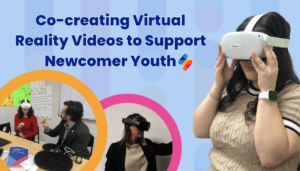New to refugee services? This resource collection is for you! This blog post, written in partnership with Cultural Orientation Resource Exchange (CORE). shares resources for new refugee service providers organized by topics such as case management, understanding refugee populations, equity and inclusion, mental health, employment, and more.
About Refugee Populations and Admissions
- The Refugee Resettlement Journey, CORE (2021): This e-learning course defines key United States Refugee Admission Program (USRAP) terms and explains the process refugees undergo during the resettlement journey.
- About Refugee Populations, CORE (2021): This webpage helps resettlement staff learn more about refugee populations resettling in the United States, including general information along with specific population backgrounders. Note: There are not backgrounders for every population resettled in the United States.
- Who are Refugees and How do They Arrive in the United States? Switchboard (2021): This animated video explains the process of refugee resettlement, from flight and displacement to arrival and integration, through the true story of a family’s resettlement experience. It will be accompanied by a toolkit that includes a reflection activity, a quiz, a glossary of terms, additional recommended resources, and more.
- U.S. Refugee Admissions Program (USRAP) Overview, CORE (2021): This webpage provides a step-by-step overview of the USRAP process, details on the Reception and Placement program, and the role of U.S. Ties in refugee resettlement. Content is available in multiple formats (videos, podcasts, and fact sheets) and languages: Arabic, Burmese, English, Farsi, Kinyarwanda, Russian, Somali, and Swahili.
Case Management
- Introduction to Case Management for Refugee Service Providers, IRC (2021): This interactive e-learning course includes seven modules relating to best practices and service delivery techniques to effectively engage with and support refugees as they adjust to social and economic life in their new community. It covers how to use a strengths-based case management approach which emphasizes the inherent resources each individual has to achieve their goals and to become self-reliant.
- Trauma-Informed Care: Movement Toward Practice, Switchboard (2020): This information guide describes some of the common principles and guiding practices of trauma-informed care that can inform resettlement and integration practices. Click here to stream the accompanying webinar recording.
- Trauma-Informed Care: Preventing Crises and De-escalating Difficult Situations, Switchboard (2020): This information guide reviews skills and practices that can prevent crisis, reduce harm, and de-escalate situations. Click here to stream the accompanying webinar recording.
- Demystifying Strengths-Based Services: Fostering Refugees’ Resilience in Resettlement, Switchboard (2019): This information guide aims to equip those working in U.S. refugee resettlement with evidence-informed strategies to deliver strengths-based programming. Click here to stream the accompanying webinar recording.
- Taking a Strengths-Based Approach, CORE (2020): A strengths-based approach builds on what clients bring to a situation rather than focusing on their shortcomings. In this e-learning course, resettlement staff will review principles associated with this approach and how to apply them early resettlement services.
Serving Afghan New Arrivals
- Afghan Backgrounder, CORE (2021): This backgrounder contains historical, political, and cultural information intended to cultivate a general understanding of Afghans who are arriving to the U.S.
- Who are the Afghan Newcomers? Switchboard (2021): This webinar provided an overview of events leading to the displacement of Afghan newcomers to the U.S. It also covered the social and cultural aspects that distinguish this population from other refugee groups in the United States.
- A Round-Up of Resources for Serving Afghan Evacuees, Switchboard (2021): This blog post lists resources you may find helpful in serving Afghan clients, including resources in Dari and Pashto.
For more resources on serving this population, click here!
Equity and Inclusion
- Cultural Competence in Refugee Service Settings, Switchboard (2020): This information guide highlights key culturally competent approaches in refugee service settings, based on an original literature review conducted by Switchboard in 2020. Click here to stream the accompanying webinar recording.
- Fundamentals of Equity and Resettlement: Understanding Social Identities in Resettlement Services, Switchboard (2021): This information guide is designed to aid in deeper engagement on race, equity, and social identities in resettlement services. Click here to stream the accompanying webinar recording.
Mental Health and Wellness
- A Trauma-informed Understanding of Mental Health & Psychosocial Support (MHPSS), Switchboard (2021): This information guide reviews key MHPSS concepts relevant to those who are designing and implementing services that seek to improve resettled refugees’ mental health and psychosocial wellbeing. Click here to stream the accompanying webinar recording.
- Strategies for Staff and Supervisors to Mitigate Burnout, Vicarious Trauma, and Other Occupational Hazards, Switchboard (2020): This webinar describes practical ways that agencies and individuals working with refugees can address occupational hazards including burnout, secondary traumatic stress, vicarious trauma, and compassion fatigue.
- Cognitive Load and How to Manage It, CORE (2021): This e-learning course explains how cognitive load can impact retention of information. Resettlement staff will walk away with identified techniques to minimize cognitive overload and improve learner retention of information during the early resettlement period.
Cultural Orientation
- About Cultural Orientation, CORE (2020): This webpage provides an overview of Cultural Orientation, a service refugees receive to acquire vital knowledge, skills, and attitudes needed to adapt to their new lives and achieve self-sufficiency. Sign-up here to receive updates and resources for Cultural Orientation delivery.
- Cultural Orientation Defined, CORE (2021): This e-learning course explains the purpose of Cultural Orientation and the differences between overseas and domestic Cultural Orientation. Click here to access accompanying Provider Onboarding toolkit for staff delivering Cultural Orientation.
Office of Refugee Resettlement (ORR) Policy Letters
Since October 2015, ORR has released policy letters that update grantees and refugee service providers on a variety of topics including client eligibility for services; information on ORR programs; guidance on funding, lobbying, cash assistance, and COVID-19 support; and more.
Click here to access these policy letters.
Employment
- Effective Employment Services Video, Switchboard (2021): This animated video provides an overview of six key employment functions, beginning with intake and assessment to post job-placement assistance. The video is accompanied by a glossary of key terms, a quiz, and a transcript. These resources are designed for new employment service providers and they can be incorporated into the onboarding process.
- Employment Authorization Documents: Reference Guide for Refugee Service Providers, Switchboard (2021): This reference guide covers the most important and commonly used authorization documents required for employment in the United States. It includes information on the form I-9, accepted documents typically held by ORR-eligible clients, possible combinations of documents based on immigration status, FAQs, and a list of resources to share with employers.
- Employment for Refugee Women, CORE (2018): This archived webinar discusses how resettlement staff can engage refugee women in discussions on the topic of employment, including the use of CORE’s refugee-facing employment resources.
- Employment: Activity Bank, CORE (2020): This webpage contains activities resettlement staff can use discussing the topic of employment, including scenarios that can facilitate discussions on the importance of multiple members of the family working.
- Refugees and Asylees Have the Right to Work, Switchboard (2020): This webinar featured a special guest presentation from the Department of Justice Civil Rights Division’s Immigrant and Employee Rights Section where real case scenarios are discussed. It also includes a Q&A panel discussion featuring refugee service providers.
Language Access
- Introduction to Working with Interpreters, Switchboard (2019): This e-learning course includes key terms related to interpretation, describes the interpreter’s role, and explains why quality interpretation is important when providing services to limited English proficient (LEP) clients.
- Overcoming Challenges in Interpretation, Switchboard (2019): This e-learning course includes tips for preparing and opening a session with an interpreter, how to support an interpreter in improving the quality of an interpreted conversation, and steps to address common interpretation challenges.
- Working Effectively with Interpreters, CORE (2021): This e-learning course for CO providers explains the roles and responsibilities of resettlement staff and their interpreter when delivering Cultural Orientation sessions. Resettlement staff will learn the steps required to ensure interpreters are well-prepared for a Cultural Orientation session.
- Working with Interpreters, CORE (2021): This webpage was developed to assist resettlement staff and interpreters to successfully collaborate and streamline the delivery of key Cultural Orientation messages. Resources include a multilingual Cultural Orientation glossary of common resettlement terms that can be used by resettlement staff and interpreters.
Monitoring and Evaluation
- Introduction to Monitoring and Evaluation (M&E), META (2016): This module reviews common M&E terminology and introduces a key M&E tool, the logic model.
- Collecting Client Feedback Data, Switchboard (2019): This information guide discusses the importance of client consent in data collection and covers six key questions to ask yourself when choosing appropriate methods for collecting client feedback.
- Developing Strong Program Reports Switchboard (2019): This information guide provides suggestions for drafting a report narrative, incorporating a table of key indicators, and choosing the types of graphs which may strengthen your program reporting. It also provides guidance about using the results of your reporting for program learning.
Stay Connected!
- Subscribe to the Switchboard newsletter
- Subscribe to the CORE Connection newsletter
- Subscribe to the National Resource Center for Refugees, Immigrants, and Migrants (NRC-RIM)
- Subscribe to the Center for Victims of Torture newsletter
- Subscribe to USAHello
If you know of other resources or technical assistance providers that should be added to this list, email Switchboard@rescue.org!









